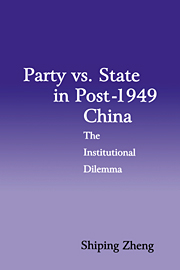Book contents
- Frontmatter
- Contents
- List of Tables
- Acknowledgments
- List of Abbreviations
- Part I Introduction
- Part II State-building under a Revolutionary Party: The Mao Zedong Era
- 3 Revolution, Laws, and Party
- 4 Party Leadership and State Administration
- 5 Army-Building and Revolutionary Politics
- 6 Politics of Campaigns: The Cultural Revolution
- Part III State-building under a Reformist Party: The Deng Xiaoping Era
- Conclusions
- Appendix A CCP Membership Changes, 1921–96
- Appendix B Campaigns in China, 1950–89
- Bibliography
- Index
4 - Party Leadership and State Administration
Published online by Cambridge University Press: 23 September 2009
- Frontmatter
- Contents
- List of Tables
- Acknowledgments
- List of Abbreviations
- Part I Introduction
- Part II State-building under a Revolutionary Party: The Mao Zedong Era
- 3 Revolution, Laws, and Party
- 4 Party Leadership and State Administration
- 5 Army-Building and Revolutionary Politics
- 6 Politics of Campaigns: The Cultural Revolution
- Part III State-building under a Reformist Party: The Deng Xiaoping Era
- Conclusions
- Appendix A CCP Membership Changes, 1921–96
- Appendix B Campaigns in China, 1950–89
- Bibliography
- Index
Summary
BY late 1953, the economic situation in China had significantly improved. A three-year period (1950–52) of economic recovery enabled the new regime to get national finance and the economy under control. Gross industrial and agricultural production had not only surpassed the level of 1949, but the highest recorded level in history. As China's First Five-Year Economic Plan was soon to be put into effect, efforts had to be made to enhance state capacities, particularly regarding the management of the national economy. To a large extent, China's economic growth was contingent on a strong administrative state.
As a centralized government administration developed, however, the Party's organizational control also expanded. A growing state and an expansionist Party then raised questions about who should administer state affairs and how economic production would be organized. This chapter examines the structure of “dual role” in the central and provincial government, analyzes the emerging tensions between the Party organization and government agencies, particularly during the Great Leap Forward in 1958–60, and offers a new perspective on the issue of central–local relations by emphasizing an analytical distinction between the Party and state.
- Type
- Chapter
- Information
- Party vs. State in Post-1949 ChinaThe Institutional Dilemma, pp. 79 - 105Publisher: Cambridge University PressPrint publication year: 1997

